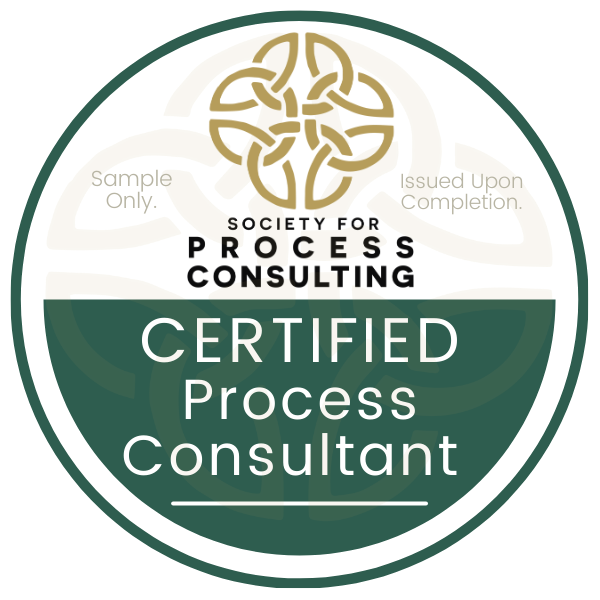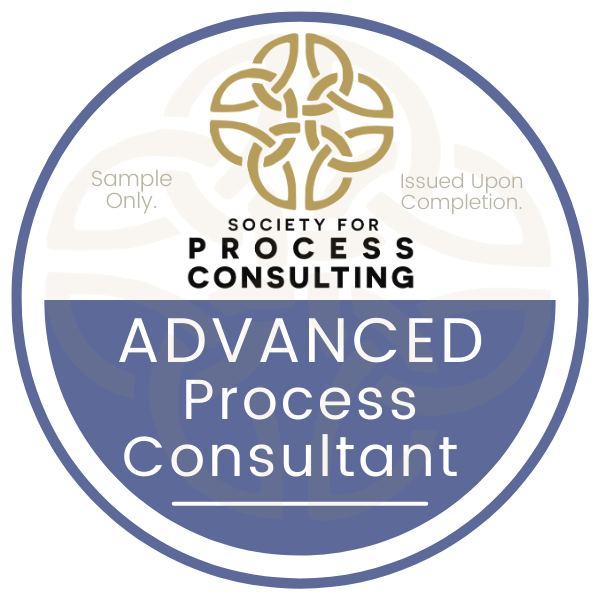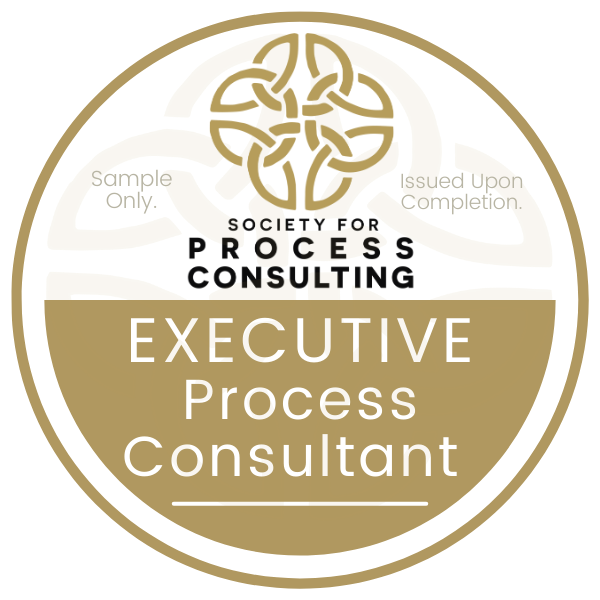Certifications
Earn your certifications to signify proficiency as a Process Consultant
The process for completing coursework toward a credential involves a combination of cohort-based and individual learning, guided by course facilitators. Below are the three credentials that have been approved by the Society's Standards and Ethics Committee.

CERTIFIED PROCESS CONSULTANT™ (CPC)
- Three years related vocational experience with résumé on file
- Bachelor's degree or proven equivalent
- Completion of the Process Consultation 101 Course
- Business mentoring, provided through the course, by an Executive Process Consultant™ (EPC); current commitment of two 30-60 minute phone calls or video conferences during the 6-week course
- Certification cost $3,250
Effective 3 Years at a time.

ADVANCED PROCESS CONSULTANT™ (APC)
- Previous earning of CPC status
- Five years of vocational experience with documentation on file
- Service to 10 clients with documentation on file OR 10 distinct projects with 5 clients
- Completion of the Process Consultation 201 course
- Certification cost $3,250
Effective 4 Years at a time.

EXECUTIVE PROCESS CONSULTANT™ (EPC)
- Previous earning of APC status
- Seven years of vocational experience with documentation on file
- Service to 20 clients with documentation on file
- Recommendation from one-course instructor OR one client, with a letter on file
- Completion of the Process Consultation 301 Case Study Lab
- Completion of an integration paper or portfolio that is expertise-specific
- EPCs can serve as instructors and mentors for people pursuing a credential
- Certification Cost $3,250
Effective 5 Years at a time.
Process Consulting Training 101 (PCT 101):
Introduction to Process Consulting and Building a Consulting Business
Course Summary:
Process Consulting Training 101 is a comprehensive course that merges the principles of process consulting with the pragmatic insights needed to initiate or develop a consulting practice. Tailored for individuals looking to launch or grow their consulting business, this course offers a thorough examination of Process Consulting. It covers essential methods, Core Competencies, and strategies for mastering complex organizational change and interpersonal dynamics.
Goal:
Upon completion of the course, participants will be well-prepared to attain the Certified Process Consultant™ credential. This achievement is based on a solid understanding of process consulting principles and the development of a viable business plan.
Learning Outcomes:
This course is designed to equip participants with essential skills and knowledge for launching and growing their consulting practice. Participants will gain insights into the iterative process, understand the consultative pipeline, pricing, and negotiation, learn to build a strong professional network, maintain brand standards, and develop their personal brand. Additionally, they will explore using social media for business growth, working with specific consulting platforms, understanding the consultative ecosystem, and strategies for ensuring authenticity, continuous learning, improvement, and planning for future success.
Who is this for?
This course is tailored for individuals aiming to expand and grow their consulting business and for those new to the field who want to start a consulting practice.
Certification Received Upon Completion:
Certified Process Consultant Credential
Process Consulting Training 102 (PCT 102):
Leading Complex Change
Course Summary:
Process Consulting Training 102 provides a general introduction to Process Consulting for leaders within a company or organization who are responsible for managing complex change or multiple projects and processes. In addition to covering the basic framework for Process Consulting, the course introduces the Core Competencies of Process Consulting. It provides resources for organizational and interpersonal dynamics involved in a complex process, and sets up the learner to grow their competencies over time. Teams often participate together.
Goal:
Upon completion of the course, participants will be well-prepared to attain the Certified Process Consultant™ credential. This achievement is based on a solid understanding of process consulting principles and the development of a brief implementation plan for their work setting.
Learning Outcomes:
Session 1 – Understanding the Iterative Process
Session 2 – Understanding the Dynamics of Change
Session 3 – Managing Multiple Processes
Session 4 – Honoring a Process Consulting Ecosystem
Sessions 5 & 6 – Core Competency: Listening
Sessions 7 & 8 – Core Competency: Helping
Sessions 9 & 10 – Core Competency: Learning
Session 11 – Ensuring Authenticity, Continuous Learning & Improvement
Session 12 – Planning Your Next Six Months
Who is this for?
This course is ideal for project managers, department heads, executives, and others who hold responsibility for managing complex change within their organization.
Certification Received Upon Completion:
Certified Process Consultant Credential
Process Consulting Training 201 (PCT 201):
Mastering the 12 Core Competencies of Process Consulting
Course Summary:
PCT201 is the definitive course for gaining deep proficiency on the Core Competencies of Process Consulting, providing insight and practical application for Process Consultants and for anyone invested in making a consulting relationship work successfully. Professional Process Consultants cultivate these core competencies as they serve their clients. Even more, the understanding and intentional cultivation of these twelve competencies distinguish a person as having completed advanced training and status in the Process Consulting profession.
Goal:
Participants completing the course will be equipped to achieve the prestigious Advanced Process Consultant™ credential, earned through the successful completion of coursework and a certification assignment.
Learning Outcomes:
Participants will master active and comprehensive listening, progressing from conceptual to architectural listening. They will develop a client-centered approach, tailoring support for client success. Additionally, participants will engage in collaborative learning partnerships for wisdom acquisition and knowledge exchange.
Who is this for?
This course is ideal for anyone who wants to understand and apply the Core Competencies of listening, helping, and learning into their leadership and in support of others.
Certification Received Upon Completion:
Advanced Process Consultant Credential
Building a Thriving Consulting Ecosystem
Process Consulting Training 251 (PCT 251)
This course provides an inquiry and process approach to building a thriving consulting ecosystem. In addition to using the inquiry and process methodology, course takers will take advantage of best-in-class writings on the concepts of organizational design, strategic theory, governance, and business valuation. Coursework is available to help you consider your consultancy’s sense of belonging, framework of relationship building, and consultant interconnectedness.
Why take this course?
It is important to recognize that we each have our own purposes in taking this course. As you dive deep into this course with your course facilitator, these purposes will become more and more clear to you. As we begin, we propose five purposes, each of which are explored in this courses twelve lessons. We also propose that these five have a priority (from #1 to #5). These five purposes are:
- To expand the collective impact of your consultancy
- To create a sense of belonging within your consultancy
- To expand your enterprise by doing this work together rather than alone
- To create opportunities for shared learning that further enhances a consultant’s ability to help a Client
- To have financial freedom for owners as well as other involved in the consultancy
Process Consulting Training 301 (PCT 301):
Executive Process Consulting
Course Summary:
This course is for internal and external consultants committed to Process Consulting, who wish to do so with executive level skills. Problems and opportunities at the executive level of an organization are often the most complex, the most adaptive, the most inter-disciplinary, and often involve the longest timeframes.
Why take this course?
A Certified Process Consultant:
- Can design a Client-defined and Client-owned process using an iterative method.
- Has developed a business plan for a specific Process Consulting Practice, or has developed
a methodology for Process Consulting within a specific organization.
An Advanced Process Consultant:
- Can recognize, articulate, and demonstrate the Core Competencies of Process Consulting.
- Has demonstrated the ability to lead a Process Consulting professional engagement and create artifacts.
The Executive Process Consultant (Objectives for PCT301):
- Can recognize and facilitate a complex and multi-faceted Process Consulting engagement, inviting enterprise-wide thinking on the part of participants, especially at the executive level of the organization.
- Develops and uses visuals within Process Design and facilitation.
- Continues to advance their practice by developing and making use of case studies and related conversations with other practitioners.
Learning Outcomes:
PCT301 is considered the capstone course for accomplished Process Consultants. The course facilitates learning and increased skill in these areas:
- Session One: Executive Thinking, Being, and Doing (Lessons One and Two)
- Sessions Two: Design Thinking (Lessons Three and Four)
- Session Three and Four : Visualizing Process (Lessons Five through Eight)
- Sessions Five and Six: Case Studies (Lessons Nine through Twelve)
- The Capstone Assignment (to be completed in the weeks that follow)
- Case Studies have been part of teaching Process Consulting from its earliest days, growing out of the research of the Father of Process Consulting, Edgar Schein. The development of these case studies, helps the Process Consultant live out the Process Consulting Core Competency of Learning for Posterity, as they render their experiences and learning for themselves, their Clients, their colleagues, and for future Process Consultants.
- For the Capstone Assignment - It’s pretty simple. Prepare a case study from your practice. The case study should have the following criteria:
- A completed Client engagement.
- A written description of the Client engagement, including insights gained and continuing questions for future learning.
- Include all Client artifacts (e.g. Client Consulting Agreement)
- Visuals that were either involved in the Client Engagement or visuals you create after looking back and developing visuals that would have assisted then and perhaps may be included in the future. A good starting point are the visuals noted in lesson 11 of this course.
- Send this capstone to the facilitator, as well as Gaëlle Thibault at the Society for Process Consulting for their records.
- Set up a time with the course facilitator to debrief your case study.
The format of each Session will include:
- Reading
- Class sessions (synchronous and asynchronous)
- Discussion
- Assignment posting and (Lessons 11 and 12) a Case Study Presentation
Customized Trainings
We can customize process consulting trainings for your event or organization and would love to work with you on this. Please contact admin@societyforprocessconsulting.com for more information.
